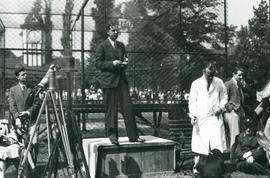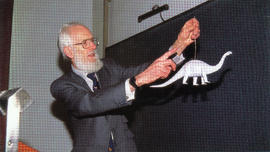Zoologist, Acting Superintendent of the Gardens and Secretary to the Garden Committee of the Zoological Society of London (appointed 1902)
Barlow was born in South Mimms, Hertfordshire, to his father Thomas WIlliam, a Clerk. He was educated at Blundell's School, after which in 1816 he started attending Trinity College, Cambridge. He earned his BA in 1820 and his MA in 1823. In 1822 he became the curate of the parish of Uckfield, Sussex. On 23rd March 1823 he was ordained as a priest. From 1830-1843 he was rector to the parish in Little Bowden, Northamptonshire. In 1824 he married Cecilia Anne Lam.
In 1832 Barlow joined the Royal Institution of Great Britain and he would serve many positions including Manager (1838), Secretary of the Lectures Committee (1841) and Honorary Secretary (1843-1860. Barlow was elected into the Royal Society in 1834 and served as Secretary of the Zoological Society of London from 1837-1838.
In 1851 Barlow became minister of the Duke Street Chapel, London and from 1854-1859 he was Chaplain-in-Ordinary at Kensington Palace.
Huxley was an English evolutionary biologist, eugenicist and internationalist. He was a proponent of natural selection and a leading figure in mid-twentieth century modern synthesis. He was Secretary of the Zoological Society of London 1935-1942, the first Director of UNESCO, a founding member of the World Wildlife Fund, the President of the British Eugenics Society 1959-1962, and the first President of the British Humanist Association.
He was well known for his presentation of science in books and articles, and on radio and television. He directed an Oscar winning wildlife film. He was awarded UNESCO's Kalinga Prize for the popularisation of science in 1953, the Darwin Medal of the Royal Society in 1956, and the Darwin-Wallace Medal of the Linnaean Society on 1958. He was knighted in 1958. In 1959 he received a Special Award of the Lasker Foundation in the category Planned Parenthood - World Population.
In 1935 Huxley was appointed Secretary to the Zoological Society of London, and spent much of the next seven years running the society and its zoological gardens, London Zoo and Whipsnade Park, alongside his writing and research. Huxley introduced a range of ideas for making the Zoo child friendly. He fenced off the Fellow's Lawn to establish Pets Corner, appointed new assistant curators who he encouraged to talk to children, and he initiated the Zoo Magazine.
Barlow was a British Psychiatrist, Physiologist and businessman. He was born in London in 1915, the second son of Sir Alan Barlow, son of Sir Thomas Barlow, royal physician. His mother was Lady Nora Barlow, daughter of Sir Horace Darwin. He was a great-grandson on the naturalist Charles Darwin. He was educated at Marlborough College and Trinity College, Cambridge where he studied medicine. He also studied at University College London.
Barlow was senior lecturer and honorary consultant in psychological medicine at St Thomas's Hospital Medical School (1951-1966), Vice Chairman of the Mental Health Research Fund, and a member of the scientific staff of the MRC Department of Clinical Research, University College Hospital. He was Chairman of the Bath Institute of Medical Engineering and a founding member of the Erasmus Darwin Foundation at Lichfield. He was also, at various times, Chairman of the Cambridge Scientific Instrument Company, the firm founded by his maternal grandfather, and a Director of CIC Investment Holdings, Deputy Chairman of George Kent Ltd and a Director of Group Investors Ltd. Barlow also published research papers in physiology and psychiatric medicine.
He was a Founder Fellow of the Zoological Society of London and its Secretary between 1980 and 1982. In 2008 the Society started the Erasmus Darwin Barlow Conservation Expeditions named in his honour.
Barlow was a trustee for over 20 years of the Barlow Collection of Oriental Art collected by his father. In 1997 Barlow, along with his brother Sir Thomas Barlow, 3rd Baronet, was awarded an honorary Doctor of Letters degree by the University of Sussex, who were bequeathed the Barlow Collection in 1968. He became a Liveryman of the Worshipful Company of Scientific Instrument Makers in 1965 and was Master for 1976-1977.
He married Brigit Ursula Hope Black, daughter of the author Ladbroke Black in 1938, and they had three children. Barlow died in Cambridge from renal failure in 2005.
John Guest Phillips was born in Swansea and educated at Llanelli Boys' Grammar School and the University of Liverpool, where, after gaining his Bsc, he joined the research group of Chester Jones to complete a PhD in endocrinology. Following his doctorate his took up a fellowship at the Bingham Oceanographic Laboratory at Yale University with Grace E. Pickford. After a lectureship at Sheffield University, Phillips was appointed to the Chair of Zoology at the University of Hong Kong.
He returned to the United Kingdom to become Professor of Zoology from 1967-1979, and Dean of the Faculty of Science 1978-1980 at the University of Hull, Director of the Wolfson Institute for Gerontology 1979-1986, and later Vice-Chancellor of Loughborough University 1986-1987. He was Secretary of the Zoological Society of London. His research was predominantly in the fields of endocrinology, notably concerning the salt glands of sea birds, and the biological basis of ageing.
Robert McNeill Alexander was a British Zoologist and an authority in the field of biomechanics. Until 1970 he was mainly concerned with fish, investigating the mechanics of swim bladder, tails and the fish jaw mechanisms. Subsequently he concentrated on the mechanics of terrestrial locomotion, notably walking and running in mammals, particularly on gait selection and its relationship to anatomy and to the structural design of skeletons and muscles.
Alexander was born in Lisburn, Northern Ireland and educated at Tonbridge School, Trinity Hall, Cambridge and the University of Wales.
After holding a lectureship at University College of North Wales 1958-1969, he was Professor of Zoology at the University of Leeds from 1969 until his retirement in 1999, when the title of emeritus professor was conferred on him.
He was Secretary of the Zoological Society of London 1992-1999. He was President of the Society for Experimental Biology 1995-1997, President of the International Society of Vertebrate Morphologists 1997-2001 and editor of the Proceedings of the Royal Society B 1998-2004.
Alexander married Ann Elizabeth Coulton in 1961. He died in 2016 at the age of 81.
Paul H Harvey is a British evolutionary biologist. He is Professor of Zoology and was Head of the Zoology Department at the University of Oxford from 1998 to 2011 and Secretary of the Zoological Society of London from 2000-2011, holding these posts in conjunction with a professional fellowship at Jesus College, Oxford.
He was educated at the University of York, where he was awarded a Bachelor of Science and a Doctor of Philosophy degree.
He was elected a Fellow of the Royal Society in 1992. He was awarded the Scientific Medal and the Frink Award from the Zoological Society of London, the J. Murray Luck Award from the National Academy of Sciences, and the University of Helsinki Medal. He was appointed Commander of the Order of the British Empire in 2008.
Sir William MacGregor Henderson was a Scottish veterinary expert on foot and mouth disease. He was President of the Zoological Society of London 1984-1989.
ZSL Staff
Office Boy, later Clerk and Public Relations Officer at ZSL London Zoo. Created Pets Corner

